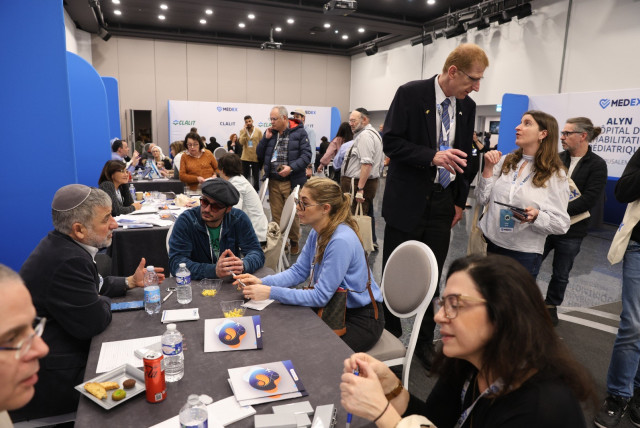Can immigration solve Israel's doctor shortage?

Regulation change and anticipated retirement of doctors who immigrated from the Soviet Union are contributing factors to Israel's doctor shortage. A new program seeks to alleviate it.
Hundreds of French doctors attended a medical aliyah exposition in Paris last week, as part of a joint endeavor by the Health Ministry, Aliyah and Immigration Ministry and Nefesh B'Nefesh to bring doctors to Israel. This program is part of a national effort to alleviate the Israeli doctor shortage, and especially an imminent shortage that will be caused by regulation changes and the anticipated retirement of doctors who immigrated from the former Soviet Union and are nearing retirement age.
NBN co-founder Tony Gelbart said Israel was facing a "perfect storm" of factors contributing to this shortage. When the iron curtain fell, Israel had benefited from a wave of doctors immigrating from the former Soviet Union, but these physicians were approaching retirement.
Gelbart said there are not enough medical students graduating in Israel and few slots for medical schools in the country. Many aspiring medical students have been going to study abroad, but many of these institutions, such as those in Eastern Europe, may not give them certification in Israel following a 2019 reform that cut many schools from the list of those authorized to prepare Israeli students to practice in Israel.
Currently, some 34% of doctors coming into the Israeli medical system are coming from these now unauthorized schools, according to Health Ministry Deputy Head of Administration for Strategic and Economic Planning, Rachel Berner.
Nefesh B'Nefesh co-founder Rabbi Yehoshya Fass said that Israel is recalibrating its system to create a steady flow of physicians, and mass immigration of new doctors would serve as a stopgap. Gelbart said that several new medical education facilities were being built, but they would be ready in five to seven years.
"There is currently a physician shortage in Israel," Fass said at the Paris event, and Shalem echoed this sentiment. She explained that this shortage is specific to certain specialties and geographic locations.
The Israel-Hamas war had also created stoppages in the medical system, a representative from the Assuta Ashdod hospital said. They described a flow in the medical system in which medical students shift into residency, doctors take tests for specializations, receive promotions, and retire, but the war had delayed some of these milestones. Yet while the war is immediately on the minds of Israelis, the Assuta representative said that hospitals need to think months and years ahead when it comes to human resources.
NBN and its partners, the Immigration Ministry, Health Ministry, and Jewish Agency, hope to aid 2,000 doctors make aliyah over the next five years.
The program is not aimed at solving deeper rooted issues contributing to Israel's doctor shortage, but the organizations involved hope that it can be a stopgap to help Israel through what could be an acute shortage.
Israel's doctors union and Mirsham, its medical residents organization, say that there is a shortage in "tkanim" (the number of spots in Israel's doctor quota). This raises the concern that an aliyah program for doctors might bring doctors to Israel, and have no job for them here once they arrive. According to the Health Ministry, there is no such shortage.
Mirsham contests quotas presented by health ministry
The details of the shortage in quotas presented by the health ministry are contested by Mirsham, who claim that there is a shortage of spots for doctors across the country, including in the periphery. A "high percentage" of doctors who have finished their internship and have a license to practice medicine are waiting for spots, according to a Mirsham position paper.
Some of the spots for the incoming doctors are funded by the Aliyah and Absorption Ministry, with 70 tkanim funded for two years while the doctors acclimate, said Shalem. After this period, the doctors will be guaranteed jobs by the hospitals where they acclimated.
While the Israeli healthcare system is "lean" when compared to systems around the world, Shalem said, a large-scale change in budgets or quotas that could add more doctors is a national decision that must be made at the government level, Shalem said. While for some specialties at some hospitals, there are no open spots, for certain hospitals and/or certain specialties, there are many spots open, Shalem explained.
The Assuta Ashdod representative said that they wanted to employ more anesthesiologists and, as a growing institution in the process of building new geriatric and cancer wards, wanted physicians who work in those respective fields. A Shaare Zedek Medical Center representative said that in their experiences, "lots of good experience and methods are brought by immigrant doctors," and two-thirds of their anesthesiologists are immigrants. Shaare Zedek needs more pathologists and neonatologists. The representative said that most of the specialists in these fields were above 70 years old, and younger doctors weren't interested in these taxing subjects.
The Jerusalem ALYN Hospital, a rehabilitation center for physically challenged and disabled children, adolescents, and young adults, needs three doctors, but even bringing one from France would be considered by its representative as a success. They need doctors in the fields of pediatrics and rehabilitation, a niche overlap that makes the search more difficult, they said.
The specific needs of different hospitals is something that will be made clear to doctors who are looking to immigrate, Shalem said. They will be encouraged to go to the hospitals that need them most, many of which are in Israel's periphery, she explained.
Another concern that the new program seeks to address is the fluency in Hebrew of the immigrating doctors. "It doesn't solve anything to bring these doctors if you don't expedite their ulpan (Hebrew School)," said an official from Mirsham. There has been a significant shortage of medical ulpanim, because salaries offered to teachers are so low, she went on to say.
The program aims to include more ulpan solutions, including lessons that start before the doctors make aliyah, Shalem said. The Aliyah Ministry said that it would pay and provide for ulpanim to the needs of the incoming doctors.
NBN brought 210 volunteer physicians to volunteer in Israel after the October 7 Massacre. 7000 people expressed interest in volunteering and signed up to this program, which Gelbart said showed its potential. Cardiologist and Association des Médecins Israélites de France vice-president Dr. Laurent Sebagh said that many more French doctors wanted to volunteer, but were unable due to Israel's medical system bureaucracy.
A major hurdle to doctors immigrating is uncertainty, said Shalem, explaining that the program aims to combat this by escorting doctors through every step of their immigration and providing care and support with every aspect of their move.
This extra funding that is needed to bring the doctors to Israel successfully is a good investment, according to Shalem, who explained that not only are the doctors whom the program seeks to bring in excellent doctors, but they are able to practice medicine in Israel in the short term, which is vitally important given Israel's upcoming shortages.
"If tomorrow morning I increase the number of spaces for medical students, I will get more doctors four to six years from now," said Shalem. "Olim doctors I get right now."
Shalem shared her worldview, saying that another benefit of the program is that it helps doctors who want to move to Israel to do so successfully. "It is a core value for the State of Israel to absorb immigration," she said.
The medical aliyah program partnership is new, but NBN has been operating the Medex program to promote the immigration of doctors for eight years.
"We saw that there were a lot of American doctors who wanted to come to Israel," said Fass, but they identified that many were getting stuck, spending up to a year pursuing accreditation and wading through bureaucracy. Fass said that this pushed them to think outside the box.
The program helps to advance the licensing and job search process before the doctors immigrate. Gelbart said it streamlined the process, more compassionate, and suitable for the needs of individuals.
"Each doctor we bring to Israel saves a life," said Gelbart.
Jerusalem Post Store
`; document.getElementById("linkPremium").innerHTML = cont; var divWithLink = document.getElementById("premium-link"); if (divWithLink !== null && divWithLink !== 'undefined') { divWithLink.style.border = "solid 1px #cb0f3e"; divWithLink.style.textAlign = "center"; divWithLink.style.marginBottom = "15px"; divWithLink.style.marginTop = "15px"; divWithLink.style.width = "100%"; divWithLink.style.backgroundColor = "#122952"; divWithLink.style.color = "#ffffff"; divWithLink.style.lineHeight = "1.5"; } } (function (v, i) { });

